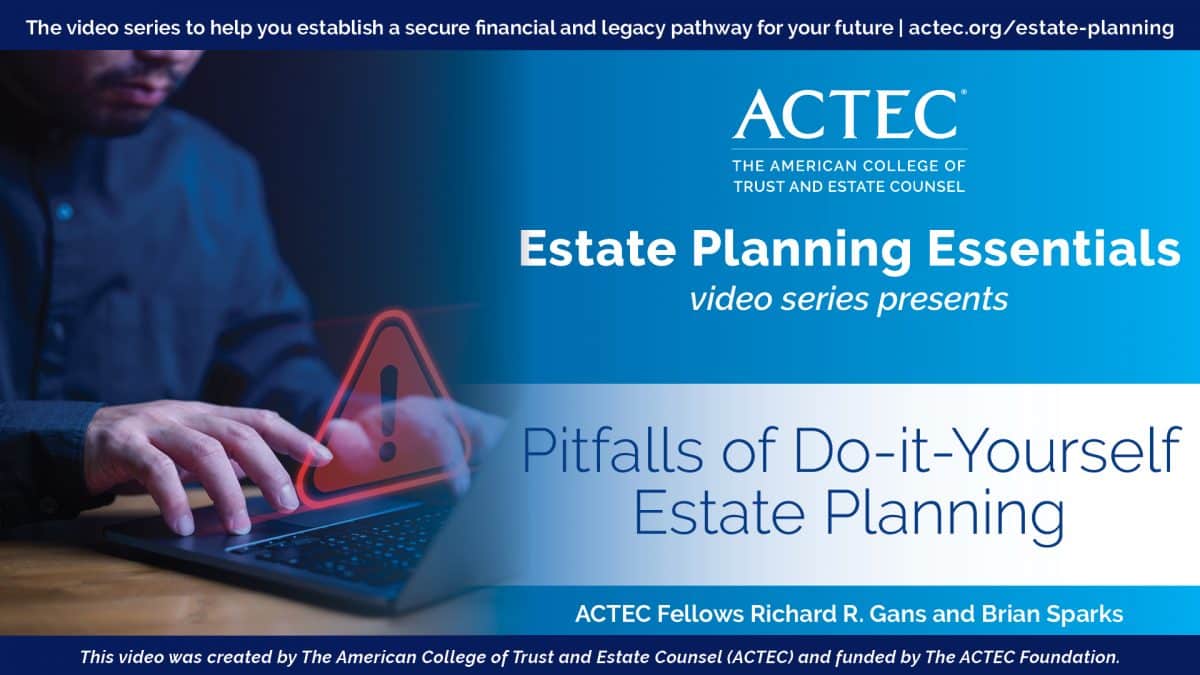Understand the pros and cons of writing a will for yourself. There may be emergencies when it makes sense to handwrite a will but know where the risks lie. Laws for writing a will differ from state to state, and the disposition of your assets can be confusing.
In this video, ACTEC Fellows Elizabeth K. Arias and Kerri L.S. Mast break down the basics of drafting a will and when it makes sense to get professional help.
Resources
Transcript
Hello, my name is Kerri Mast; I’m an ACTEC Fellow from Charlotte, North Carolina. Joining me today is Liz Arias, an ACTEC Fellow in Raleigh, North Carolina. Today we’re going to answer the question, “Can I do a will for myself?” Liz, let’s start with the basics. What is a will?
Hi, Carrie. A will is a document that an individual uses to dispose of property upon death. Most people are familiar with the concept of being able to direct how the assets that you own will be distributed when you die. A will is a document that many people have, and it can be updated and changed throughout your lifetime, but essentially whatever the last version of that will is when you die, it is the will that is filed with the court and it governs who gets your assets. So, assets like your car, your house, and bank accounts can all potentially be distributed in accordance with your will.
Well, Liz, I know what I own and I know who I’d like to receive that property upon my death so can I just write my own will?
The short answer is yes, you can write your own will. However, every state is different with respect to the requirements for what a will must say in order to be valid. For example, some states allow you to handwrite a will and there are certain requirements about it having to be signed, dated, completely in your own handwriting. But other states do not allow a handwritten will. In some states, the will needs to be typed, and it may require witnesses and a notary. So, the first step to writing your own will is to make sure you know what your state’s requirements are because if you don’t follow them your will is not going to be valid. Now the second part of your question, about whether you should write your own will even if you do know what your state’s law requires is probably just as important because when you write your own will and you have either difficult assets or you have special situations in your life that require some custom planning and drafting if you don’t write your will correctly it may not address those circumstances. If, for example, you have a minor child, if you leave part of your assets directly to that minor child that’s not going to work because minors, who are people that are under the age of 18, can’t own assets. So it may be that you need to craft a trust for that child so that the assets that you want to benefit that child flow into a trust or another type of vehicle where they can be held and managed for that child until they reach the age of 18, or maybe even a later age depending on what you want.
Sounds like there are a lot of things to consider if I’m going to draft my own will. But what if I use one of those online programs that I see? I can probably get one of those for a lot less money than if I hired a lawyer to do the will for me.
You can. It is certainly true that there are a number of online services that will allow you to prepare a will, and generally speaking, the cost of that preparation is going to be less than what you pay an attorney. But the same kind of problems exist between doing an online will in that first the will is going to have to be compliant with the law of your state and so you’ll have to input information into the program to make sure that it does comply with the law of your state and the form that is generated by the online service is going to be based on the information that you input. So, if you input any information incorrectly or if you don’t provide the right types of guidelines and parameters, you’re not going to get a document that accomplishes what you think it will. Again, an example might be of a minor child. If you don’t alert the program of the fact that you have a minor child or explain how you want the assets for that minor child to be managed, the will that’s generated may not provide for any kind of a separate account for that minor child. Likewise, if you input conflicting information so that you have assets that may be directed to be left to two different people, that’s going to create a conflict. It’s going to require more litigation at death to resolve.
And the other big thing you have to consider when you’re doing your own will, whether you’re trying to write it yourself or do it online will, is that wills do not necessarily govern the disposition of everything that you own. So for example, if you have a 401k or a retirement account, and you have filled out that beneficiary designation to name somebody, that will trump your will. So even if you put in your will I want my retirement account to be left to John, if your beneficiary designation still names Jane, Jane’s going to get the money, not John. So, there are other considerations that you have to be aware of when you’re doing a will, like how are my accounts titled, how are my beneficiary designations written, because the will may not govern the disposition of everything you own.
Liz, you raise a lot of good points about the important considerations if you’re thinking about drafting a will, but you indicate that if I want to draft my own will, I can. Bottom line, should I?
It’s a hard question to answer because if you are in an emergency situation and you need a will done then it might be best to go ahead and quickly handwrite or get a will done; but if you have the time to carefully plan and decide how you want your assets to pass it make better sense to hire an attorney who can issue spot, who can advise you of different rules applicable to how are assets are left at your death, and who know the laws of the state in which you live in. And if you go to an attorney who has that kind of specialized knowledge, then they’re going to be able to implement that plan that you put so much careful time and thought into. They’re going to be able to implement it in a document that accomplishes your goals and objectives. So, if you’re in an emergency situation, maybe yes, but otherwise, why risk it? Get the advice, and knowledge and guidance of someone who knows all the ins and outs of how wills operate in the state in which you live.
That makes a lot of sense. Thank you so much.
Featured Video
Pitfalls of Do-It-Yourself Estate Planning
A discussion of what consumers need to know about using do-it-yourself estate planning documents and DIY wills.
ACTEC Estate Planning Essentials

ACTEC Fellows provide answers to frequently asked trust and estate planning questions in this video series.



